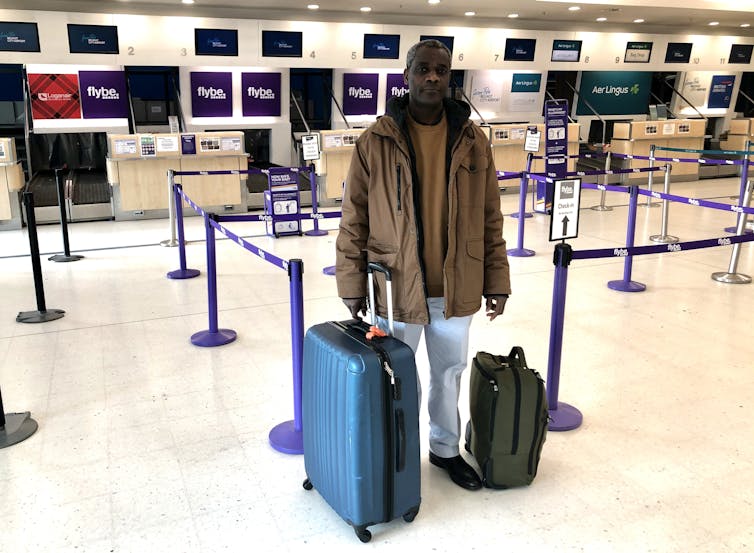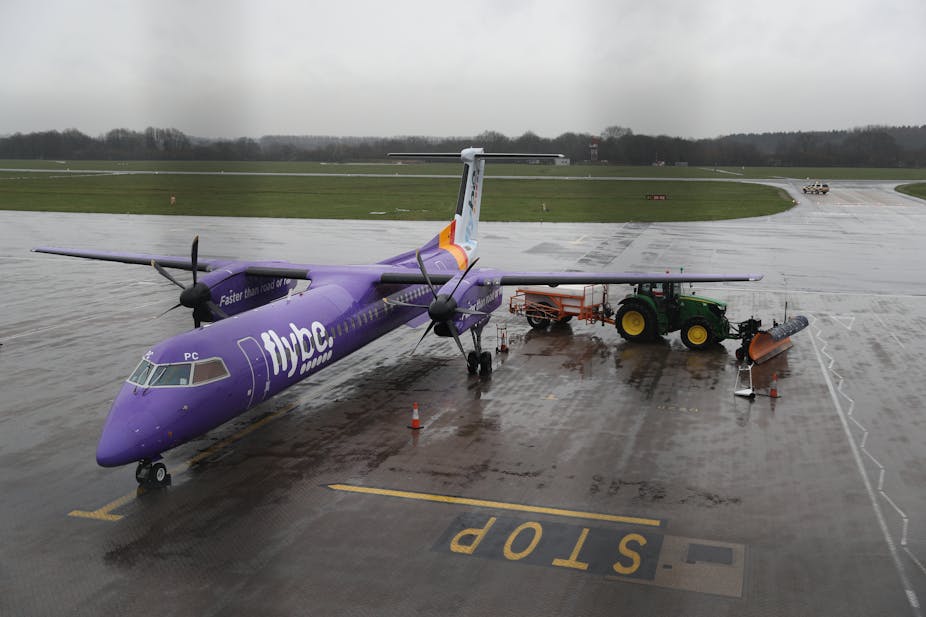Flybe’s collapse has left passengers stranded and put 2,000 jobs at risk. Europe’s biggest regional airline is thought to be one of the first business casualties of the new coronavirus outbreak, which reduced demand for flights. Both tourists and businesses have cut back on flying due to the epidemic.
But the airline had longstanding issues, which raise the question of whether the state should support a regional carrier of Flybe’s significance. While small compared to airlines such as EasyJet or British Airways, Flybe is disproportionately important for smaller airports around the UK. If you want to fly between Aberdeen, Belfast, Cardiff and Jersey, it is one of the main options, if not the only one.
Of course, this raises issues around climate change and the extent that government should support people commuting by plane between cities like London and Exeter. But more remote parts of the country, in particular are always going to difficult – and potentially unprofitable – to service. Flybe served many of them.
Flybe was rescued in July 2019 by a consortium that includes Virgin Atlantic. This followed losses of almost £30 million in 2018. Reasons for Flybe’s collapse include the competitive nature of the airline industry, an ineffective use of its fleet and a lack of clarity in its business strategy, especially so after its acquisition in 2019.

Flybe also claimed, not unreasonably, that the UK’s air passenger duty tax had a disproportionate effect on its profitability. This is a tax paid on international flights out of the country, but for internal UK flights the tax is charged on departure and arrival. So for an airline that operated 38% of UK domestic flights the duty was a significant burden. It is estimated that the duty cost Flybe around £100 million per year.
Coronavirus hit Flybe in this context. Demand for air transport is pro-cyclical, which means more people fly when the economy is strong, and fewer people fly when it is weak. For example, following crises like the 9/11 terrorist attacks, SARS and in the wake of the financial crisis fewer people booked flights. The impact of the recent coronavirus outbreak on the airline industry as a whole has been estimated at US$113 billion due to travel restrictions and reduced demand, with airlines in Asia and Europe worst affected.
A state-backed solution?
As part of Flybe’s 2019 rescue deal, the UK government agreed to defer the air passenger duty tax of £100 million for for three years and considered cutting air passenger duty for domestic flights because of the importance of the airline to public transport in the UK. The airline operates almost two in five of the UK’s domestic routes.
There followed an outcry from competitors. Ryanair and IAG (which owns British Airways) complained that the tax deferral gave Flybe an unfair advantage.
On the face of it, their objections look legitimate. But both of these airlines have been subject to similar complaints. The trade union UNITE has claimed British Airways staff are reliant on working tax credits to supplement their salary – is this so different to the public purse subsidising its profitability?
Ryanair, meanwhile, has faced numerous investigations for alleged tax evasion over the past decade. While the airline maintains in all cases that it only avoids paying taxes legally, is this so different to Flybe receiving help from the state?
Then there’s the fact that Flybe performs a public service in many respects. Its collapse reaches further than its employees and those customers whose flights have been cancelled. Flybe covers 70% of flights from Exeter Airport and 80% of those at Belfast City Airport, for example. The impact on the airports and staff, passengers flying from those airports and the local economy will be significant.
The airline also provides an important service in connecting passengers in the UK. In January 2020, the airline served 26 UK airports and 16 international airports facilitating the operations of larger international airlines like Virgin Atlantic, which only operate from major hubs like London, Manchester and Birmingham.
The more lucrative routes that Flybe used to operate will be acquired by other airlines. But, by no means will all routes find an operator, certainly not those that are unprofitable, irrespective of their value to the communities they serve.
There is perhaps good reason to object to government support for an airline under private ownership, as Flybe was following its 2019 rescue. But its demise and the impact of administration for so many in the UK certainly raises the question of whether the government should actually run a regional carrier.
This would not be without precedent – the government of the island of Guernsey owns Aurigny Airways, ensuring its citizens remain connected. Plus, the UK government has recently brought a chunk of the country’s railways under its control. Extending this idea to elements of the aviation industry is not an enormous step further to take.

